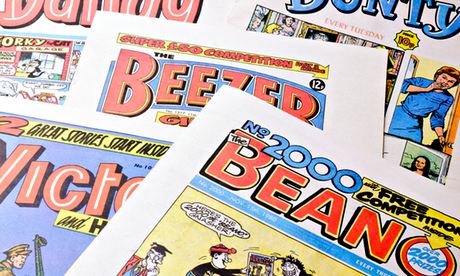
The exhibition I'm most looking forward to at the moment is Comics Unmasked: Art and Anarchy in the UK at the British Library. The premise of the exhibition is simple – that comics are not merely a bit of childish froth, but an important social, political and artistic medium.
I'm sure this is true – but for all their evolutionary impetus, comics are not as powerful a form as they once were. Certainly, adult comics have morphed into something sophisticated and challenging – the exhibition has enough controversial material to bar under-16s from entering without an adult – but surely, for kids, comics have long been supplanted by apps, video games and the glut of good children's books.
Now when I go and check the shelves to buy comics for my children, Louise and Eva, I notice two things. First, standalone comics are hard to find. With the exception of The Phoenix, a terrific publication started in 2012 that tries to return to the basic principles of kids' comics – no gifts, only stories – nearly every title, from The Simpsons to My Little Pony to Ben 10, is a TV tie-in. Second, nearly all of them are really a toy with a comic attached – as there is no VAT on comics, you can use the "giveaways" as a cheap way of selling toys and games. One comic I saw had eight free gifts attached. The golden age of comics, at least those for children, is over.
It is hard to overstate the importance of comics to my generation. It was common for children in the 1960s to have a comic delivered once a week – my favourites were the Victor and the Beano – and when the comic dropped through the door it was the zenith of the week. The narrative form of the strips meant that readers had been left hanging on from the previous week to see what had happened to, say, Alf Tupper, Tough of the Track and the new instalment was consumed with avidity that in my case bordered on the obsessional. I don't think any comic nowadays has that sort of impact.
Comics were wonderful to get you reading, accustomed to the narrative form – a narrative form that, even then, could be highly complex. Certainly, the American DC and Marvel comics were highly experimental with form. Anyone trying to find their way round an issue, for instance, of Doctor Strange would have their imagination not only challenged by the mind-blowing story lines, but also the graphic sophistication of the layout, which dazzled your mind and eye in all directions.
Kids watching the cinematic equivalent of DC and Marvel comics characters translated on to screen nowadays can hardly understand the power of the pulp originals. There was once an issue of Superman called The Death of Superman (not to be confused with the later graphic novel title) in which Superman is finally extinguished by green kryptonite. I remember bursting into tears when I read this, moved on some profound level that I still don't understand. The power of the medium to move children's imaginations was extraordinary.
As I grew older, I read the subversive, alternative comics, such as Nasty Tales and Fritz the Cat, and later, more mature graphic novels such as Art Spiegelman's Maus and Daniel Clowes' brilliant Ghost World. But recently I sat down and read Alan Moore's acclaimed Watchmen and couldn't get past the third page. I realised it was over for me – I had finally grown out of comics.
Now I'm rather of the view of Matt Groening when he depicts Jeff Albertson, the comic books guy in The Simpsons. Albertson is a satire of those (usually men) who take comics rather too seriously. Comic books remain an important but minor art form and one that, for children at least, is past it greatest days. I feel sorry that my children never could feel the enchantment that I did, but perhaps that was merely the excitement of the thirsty man finding an oasis in a cultural desert.
• Follow Tim on Twitter @timlottwriter

